Charlotte Mitchell, a Senior Honorary Lecturer who studied and taught in the English department, has written a short history of our department.
When was the English department founded?
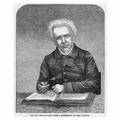
The UCL Department of English Language and Literature is rather inclined to congratulate itself on its antiquity. When, though, was the English department founded?
At the time when University College London (then called London University) opened its doors in 1828 the Reverend Thomas Dale (1797–1870) had been appointed professor of English language and literature, having previously applied unsuccessfully for the chair of Roman literature at the same college[1]. That is a fact.
Was UCL the first to offer English as a degree subject?
However, arrangements in the embryonic UCL were very different from those prevailing in British universities today, and inaccuracy often results from assuming that they were roughly the same.
For example the statement, made in the UCL Wikipedia entry, that 'In 1828 the university became the first in England to offer English as a degree subject' is open to challenge.[2]
In his two years in the post Dale taught two courses, one on 'The Principles and Practice of Literary Composition' and one consisting of 'Lectures on English Literature'.[3] But the students who attended them were not studying for degrees in English in the modern sense.
For one thing, until the statutory foundation of the University of London in 1836 UCL was merely a private institution which had no legal power to grant degrees.
Even after that and for many years later only a minority of its students took enough classes and examinations to graduate. (References to Robert Browning's sojourn at UCL which imply that there was anything anomalous about his only attending Greek classes for a couple of terms in 1828/9 therefore verge on the misleading.)
Those students who were reading for the B.A. degree of the university were obliged to study several different subjects, just as is usual in America today, and the stipulated range makes the International Baccalaureate look narrow.
The regulations for the Bachelor of Arts degree in 1839 show that the required subjects were:
- mathematics and natural philosophy
- arithmetic
- algebra
- geometry
- plane trigonometry
- hydrostatics
- hydraulics
- pneumatics
- astronomy
- chemistry
- physiology
- botany
- Greek
- Latin
- history
- logic
- moral philosophy
- French or German
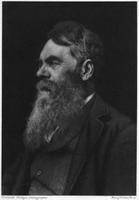
However, among the early students at UCL were several who went on to work as critics and scholars of English literature, including F. J. Furnivall (1841-2), W. C. Roscoe (1843) and R. H. Hutton (1841-5).
Dale left in 1830, disappointed at how few students enrolled to hear him (he was paid per student) and cross that English was an optional subject where Latin and maths were compulsory.[5]
None of his immediate successors stayed in the job very long either. [6] The first to do so was David Masson (1822-1907), who 1852 replaced Arthur Hugh Clough. The poet's two years at UCL were miserable, but Masson was a notably effective teacher until his departure for the better-funded chair in Edinburgh in 1865.[7]
Mention of the Edinburgh professorship of Rhetoric and English Literature is a reminder that declarations about priority ('the first in England') have to be carefully phrased to avoid misstatement. Several Scottish universities had professors lecturing on literature in the eighteenth century, and Masson's chair had been founded in 1760.
The valid claims of Birkbeck College should also be recognised. The London Mechanics' Institution, later renamed to commemorate its founder, opened in 1823 and from the beginning its curriculum included lectures on literature. The distinguished radical John Thelwall, for instance, spoke on Milton there in 1830.
University of London
In 1836 the University of London was put on a statutory basis, with University College and King's College as its constituent parts united by an examining body which also examined the work of pupils at recognised colleges (several of which were Dissenting and Roman Catholic secondary schools).
Obviously, the syllabus of any teaching for the BA from this point was ultimately determined by the federal examiners. It is clear, however, that it was many years before the BA included any opportunity to offer papers in English language or English literature.
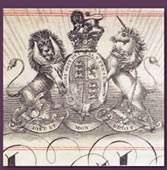
The next big landmark after the 1836 foundation of the University of London was the new charter of 1858. From this point the University's BA examinations were no longer confined to students in good standing at the affiliated colleges but open to all male candidates, whether they studied alone or in company.
Under the new arrangements 'external students' in due course sat the exams all over the British Empire, and they often gained their qualifications after heroic toil, sometimes extended over very long periods. Since such students were not necessarily to be supervised or monitored, it was agreed that an additional examination part-way through the degree would be introduced.
BA students were required first to pass the Matriculation exam (a baccalaureate-type test), then, a minimum of a year later, the Intermediate Examination in Arts or First BA, and finally the Second BA after another year. But to take only the first or only the first and second exams was not unusual. The charge was initially £5 for each exam.[8] These arrangements persisted with small modifications nearly to the end of the century.
It was at this point, under the new charter, that for the first time the London BA degree came in 1860 to include a paper in English language and literature, in the slightly insignificant position of a constituent part of the Intermediate Arts or First BA examination (alongside Mathematics, Latin, History and French or German).
You could also take an Honours paper at that point, but the final or Second BA examination did not include any English option, either at the ordinary or at the Honours level, nor was it then possible to offer English at Matriculation or for the MA degree. Before the end of the century English had gained ground to the point where it was included in the final year exams.

For example, Sir T. Gregory Foster (1866-1931), the first provost of UCL, after whom Foster Court is named, is scrupulously described in the ODNB as graduating 'with honours in English language and literature in 1888'.[9]
UCL, the first British university to admit women on equal terms
In the late 1870s open access to London degrees was expanded to include women. The first four British women graduated from the University of London in 1880. Only one of them[10] had studied at University College, although it had quietly been permitting women to attend lectures in some subjects for some years. The college soon, however, became one of the largest educators of women in the world, producing a significant proportion of all women graduates.
The London degree, however important, was all the same only one side of the story, since many students were studying with other goals. The audience at Victorian UCL lectures often included persons whom we would not think of as undergraduates.
Masson's successor, Henry Morley, for instance, who joined UCL after a long apprenticeship in the university extension movement and a stint on Dickens's Household Words, offered in the early 1880s a course of evening lectures on English literature to governesses and schoolteachers. And anyone who could afford it could sign up and pay for a single course of lectures on a subject which interested them.
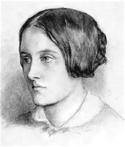
The poet Christina Rossetti is listed as a UCL undergraduate in the 1878-1879 session, having enrolled aged 48 for the sole purpose of hearing Charles Tomlinson give the Barlow lectures on Dante.
In the nineteenth century medical students, who were required to pass the Matriculation examination in order to proceed to their MB and MD degrees, are often to be found among those attending lectures by the professor of English.
Students at the Slade School of Fine Art also found their way to these classes, and indeed shame-facedly it must be admitted that so far the Slade's contribution to literature is at least as distinguished than the English department's (G.K. Chesterton, Isaac Rosenberg, Wyndham Lewis, David Storey, Gloria Escoffery).
Among other imaginative writers who dipped in and out of UCL's open and inexpensive education system during the nineteenth century were Rabindranath Tagore, Mary Frances Robinson, George du Maurier and Pearl Craigie ('John Oliver Hobbes', in whose memory a student prize is given).
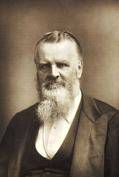
Moreover, during Morley's tenure, the chair of English was one of several UCL chairs to benefit from a proper endowment by the testamentary bequest of Dr Richard Quain (1800-1887). Morley and Ker both played hugely influential parts in the life of the college. During their careers and with their energetic assistance women's education made dramatic progress; both taught also at Bedford College for Women, and Morley's association with the university extension campaign went back to its roots in the 1850s. They were both well-known to the public as journalists and literary critics. And they also both played notable parts in the evolution of 'English' as a subject and the development of institutions promoting it, from the Browning Society to the English Association.
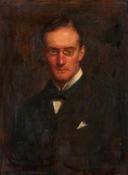
Ker also taught Icelandic and founded the UCL Scandinavian Studies department.[11] He was interested in the comparative literature of the European Middle Ages and was a man of enormously wide reading; the Times obituarist quoted Torfrida in Kingsley's Hereward the Wake: 'Which of you knows all tongues from Lapland to Provence?'[12] The increasing professionalization of the study of English during the late nineteenth century is reflected in the fact that many of Morley and Ker's pupils became influential as scholars and teachers of the new discipline. These included Walter A. Raleigh, Israel Gollancz, Edith Morley and Caroline Spurgeon.
For all Morley's success in attracting students, the system meant that the BA degree course saw little change between 1858 and the end of the century, except that the admission of women from the 1870s dramatically changed the makeup of the audience for English lectures[13], and that at about the same time the BA subjects came to include Sanskrit or Arabic as alternatives to Greek. Just at the turn of the century, however, there was radical reorganisation of both the structure of the course and its intellectual content. The 1898 University of London Act was an attempt to beef up the side of its activities which formed a London teaching university for internal students, while maintaining its popular function as a global examining university for external students. Several more existing colleges were incorporated and Boards of Studies were set up in the different subjects: Ker chaired the Board of Studies in English. For the first time it became possible for graduates of other universities to study internally in London for postgraduate degrees, which resulted in an increase in graduate work.[14] The restructuring of the Bachelor of Arts degree produced for the first time something roughly resembling a modern BA English degree, although in line with the philological enthusiasms of the period the compulsory language elements (grammar, Anglo-Saxon and mediaeval) would be likely to appal a modern first-year. The first graduates in English under the new system took their degrees in 1903. Throughout this period much of the actual teaching, especially for the more advanced exams, was done by freelance coaches employed directly by students, of whom Bloomsbury housed a large population at that time.

The celebrated Japanese novelist Natsume Soseki, for example, who arrived in 1901 on a government scholarship, was advised by Ker to employ W. J. Craig, the first editor of the Arden Shakespeare.[15] On Ker's retirement in 1922 he was succeeded by R. W. Chambers (1874-1941), who had been his pupil and had long been his assistant. He was thus the first holder of a named chair in the department to have been a native of the college (Morley had been a KCL student). He died during the college's evacuation to Wales in the Second World War.[16] Chambers, who had retired slightly earlier, in 1941, was not replaced until 1949 by his former colleague, A. Hugh Smith (1903-1967), lecturer in the department since 1930. Smith, whose interests lay in mediaeval Scandinavia and the history of place names, served as Quain professor until his death.
In 1926 the centenary of the foundation of the college had been made the pretext for a fundraising drive. In connection with this Lord Rothermere and Mr Cecil Harmsworth presented to the college in 1929 a cheque for £30,000, to endow the Lord Northcliffe Chair of Modern English Literature in memory of their late brother, who had died in 1922. Although the original plan seems to have been for the Northcliffe professor to be replaced annually after giving six lectures, its first holder, Charles Jasper Sisson (1885-1966) contrived, like Scheherazade, to make his appointment permanent, and he held it until 1951.[17] C. J. Sisson (who is not to be confused with the poet C. H. Sisson, 1914-2003) had been Reader in English Literature at UCL since 1923; he worked on Shakespeare and other Jacobean dramatists. The imprecise term 'modern' was to be understood in the sense 'post-mediaeval'. James Runciman Sutherland (1900-1996) who succeeded him and held the post till his retirement in 1967, was a specialist in the eighteenth century.
Towards the end of the 1960s, therefore, both the Quain and Northcliffe chairs became vacant, and, in the spirit of the age, both were filled by comparatively young men. Randolph Quirk (b.1920) succeeded Smith in 1968 and Frank Kermode (1919-2010) succeeded Sutherland in 1967. This was a period of much innovation, typified by the department's secession from the federal degree. From the mid 1970s the UCL English department students studied a course devised and examined by their teachers. Quirk, as director of the Survey of English Usage, undertook a large-scale research project of international significance, described elsewhere on this website.
At the very end of the nineteenth century it is possible for UCL to claim some share in the education of both Richard Aldington and T. E. Hulme, but it must be acknowledged that there is no great cluster of imaginative writers who were students in the college, let alone in the English department. Perhaps this is partly attributable to the fact that for most of the twentieth century the London University degree course required a considerable focus on early periods of literature and on the history of languages. (When the future professor Kathleen Tillotson arrived from Oxford to teach at Bedford College during the 1930s she was enchanted to discover that Gothic as well as Anglo-Saxon was a compulsory subject for undergraduates.)[18] This rigour was no doubt valuable to those, like Harold Jenkins, Barbara Hardy, Stanley Wells and David Crystal, who went on to academic careers, but may also partly account for the fact that the writers who did emerge from the college tended to have studied other subjects. Both Stella Gibbons and Antonia Forest were students on UCL's journalism course. Gladys Mitchell read history, Michèle Roberts did a graduate course in librarianship, and the Department of Philosophy can pride itself on Ken Follett. Anthony Buckeridge's brush with the college is rather obscure and may merit further enquiry.

One of the department's most distinguished alumni is David Lodge, whose novel The British Museum is Falling Down (1965) gave it its first significant appearance in fiction (if we except the fleeting glimpse offered in Henry James, What Maisie Knew: '"It MUST do us good- it's all so hideous."'). A later sighting occurs in A. S. Byatt, Possession (1990). Mercifully, by no means all the department's writers have been inspired to fictionalize it: among those who have refrained are Andrew Davies, Bel Mooney, Amit Chaudhuri, Blake Morrison, James Miller and Susie Boyt.
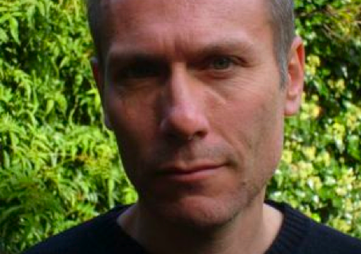
With the exception of A. E. Housman, professor of Latin 1892-1910, imaginative writers have not usually been found among the university's staff, except in the English department. Stephen Spender, A. S. Byatt and Dan Jacobson were much-loved teachers of English for many years. Grey Gowrie and Alan Hollinghurst also taught there much more briefly. Many of the department's recent student poets, such as Oli Hazzard and Declan Ryan, have benefited from the encouragement and example of Mark Ford.
In more recent years, a number of writers have emerged from UCL, by no means solely from the English department. For several years those concerned with publicizing the university to the young were enthusiastic because singer-songwriter Chris Martin had graduated from the Department of Greek and Latin; perhaps this is less true now. The Faculty of Laws is proud of Aminatta Forna. Of the English department's novelists probably the youngest is Radhika Sanghani.
References
[1] Franklin E. Court 'The Social and Historical Significance of the First English Literature Professorship in England' PMLA Vol. 103, No. 5 (Oct., 1988), pp. 796-807. See also Arthur Burns, ‘Dale, Thomas’, Oxford Dictionary of National Biography (Oxford University Press, 2004). Curiously enough, Dale also has the distinction of being the first professor of English at KCL; he worked there 1836-40.
[2] Wikipedia cites as authority for this statement Peter Barry, Beginning Theory: An Introduction to Literary and Cultural Theory (Manchester, Manchester University Press: 2002) p. 12.
[3] Court, 800.
[4] Regulations of the University of London on the Subject of Examinations for Degrees in Arts (June 1839). ‘Outlines of the Regulations for Degrees in Arts, Laws and Medicine’ in University College London Calendar (1859), 312-3, indicates that the subjects remained almost the same for the next twenty years, and did not include English. H. Hale Bellot, University College London 1826-1926 (London, University of London Press: 1929), 298, lists the subjects required by UCL to obtain the certificate of attendance necessary to take the University's degree examinations.
[5] See 'Thomas Dale' Bloomsbury People, https://www.ucl.ac.uk/bloomsbury-project/index.htm.
[6] They were Alexander Blair (resigned 1836); Henry Rogers (resigned 1839); Robert Gordon Latham (1839-45); Tom Taylor (1845-48), later editor of Punch; A. J. Scott (1848-50); Arthur Hugh Clough, the poet (1850-52); Bellot, 113-4, 258-9, 261.
[7] G. G. Smith, ‘Masson, David Mather (1822–1907)’, rev. Sondra Miley Cooney, Oxford Dictionary of National Biography (Oxford University Press, 2004).
[8] Christine Kenyon Jones, The People's University: 150 Years of the University of London and its External Students (London, University of London: 2008) 18, 21.
[9] Elizabeth J. Morse, ‘Foster, Sir (Thomas) Gregory, first baronet (1866–1931)’, Oxford Dictionary of National Biography (Oxford University Press, 2004). Foster, an Anglo-Saxon specialist who taught in the UCL English department from 1894-1904, is not the only Provost to have been a student in the UCL English department; the others are Allen Mawer (1879-1942), who served from 1930 to his death, and Ifor Evans (1899-1982) who served 1951-66. When Foster was appointed Provost his colleague R. W. Chambers published a report, 'The Refectory' University College London Union Magazine I (Christmas 1904) 33-5, which was a parody of the Chronica Jocelini de Brakelonda, the source of Carlyle’s Past and Present.
[10] Her name was Marianne Withiel (1853-1924), née Andrews; she was a schoolmistress at Notting Hill High School who later became a school inspector. There is no memorial to her at UCL, though for many years the school continued to award a leaving scholarship in her memory.
[11] R. W. Chambers, ‘Ker, William Paton (1855–1923)’, rev. A. S. G. Edwards, Oxford Dictionary of National Biography (Oxford, Oxford University Press, 2004).
[12] The Times (20 July 1923), 14.
[13] The admission of women was much more gradual, starting well before 1878, and also slower (individual professors being allowed to ban women from their lectures) than is generally recognised. And even Morley, who was a whole-hearted supporter of women's education, was still giving some classes for men or women only several years after the university agreed to grant them degrees.
[14] Bellot, 26; The Times (15 May 1902), 12.
[15] See Natsume Soseki, The Tower of London ed. Peter Milward (Brighton: In Print 1992).
[16] C.J. Sisson, 'Raymond Wilson Chambers 1874-1942' Proceedings of the British Academy XXX (1944), pp 427-39. Sisson records that the two acted as joint heads of department, and Chambers 'dubbed the Professors the Two Kings of Brentford' in allusion to Buckingham’s The Rehearsal. Chambers's unexpected death was shortly followed by that of his colleague and collaborator Dr Elsie Hitchcock, who founded the Chambers Memorial Lecture in his memory, and who is herself commemorated in a student prize for merit in Old English.
[17] The Times (19 March 1929), 11.
[18] R. W. Chambers, The Teaching of English in the Universities of England, English Association Pamphlet No 53 (July 1922), which refers to the London BA English degree's compulsory Gothic, is a passionate defence of the position that the study of Latin, French and Anglo-Saxon are essential to a serious degree in English Language and Literature; and he is still chafing about the loss of compulsory Greek.
 Close
Close

